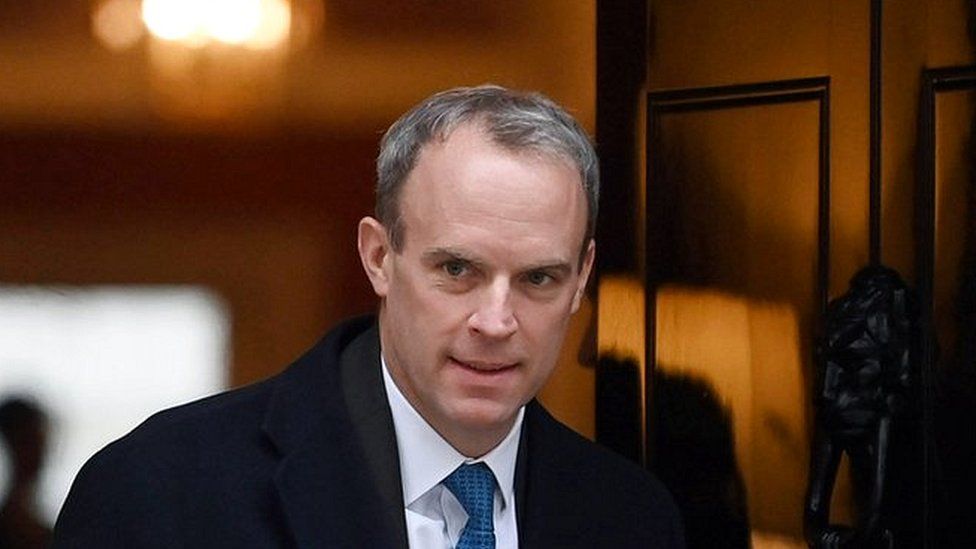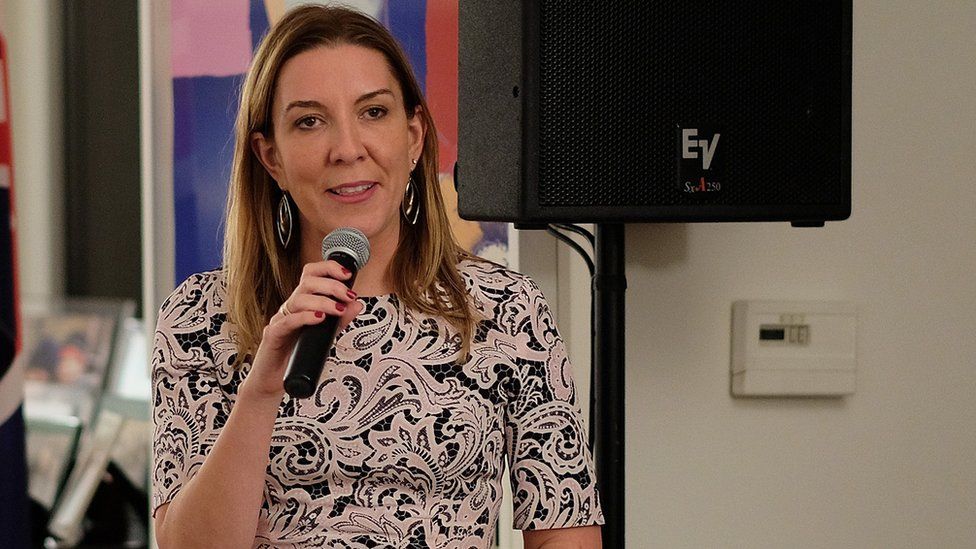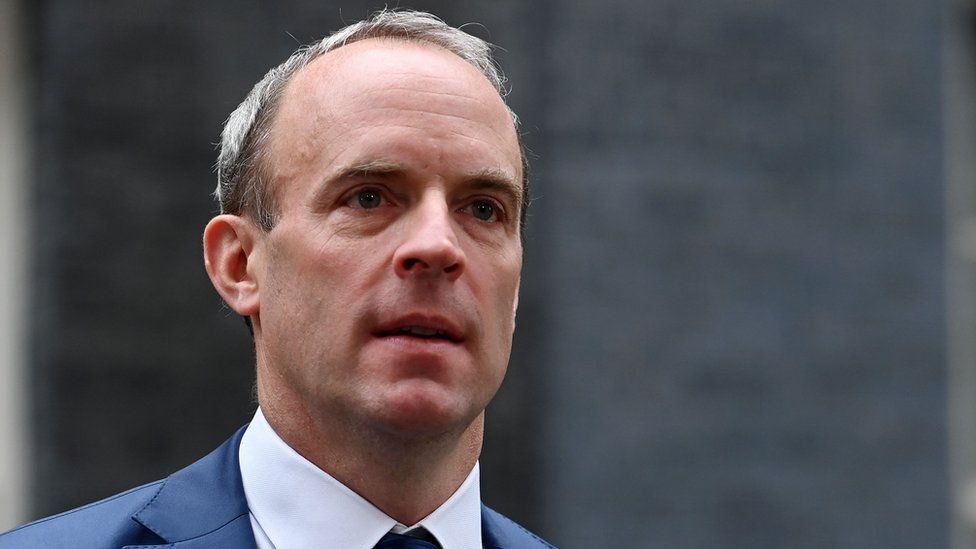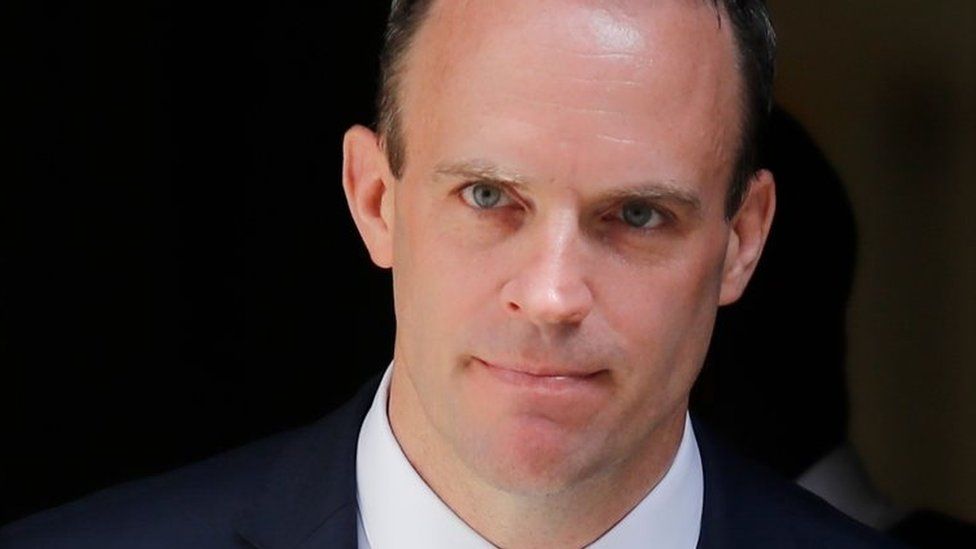Rishi Sunak under pressure over what he knew about claims against Dominic Raab
This video can not be played
To play this video you need to enable JavaScript in your browser.
Rishi Sunak is under growing pressure to explain what he knew about the bullying allegations against Dominic Raab when he appointed him deputy PM.
The prime minister’s spokeswoman would only rule out him being aware of “formal complaints” when he gave his ally the job in October.
Pressed on whether he was warned of informal complaints, she said the “usual processes were followed”.
It came after Sir Keir Starmer clashed with Mr Sunak over the issue at PMQs.
Mr Raab, who is also justice secretary, took his customary place alongside Mr Sunak on the government front bench for the weekly Commons session. He has denied bullying civil servants.
A civil service union leader has called for Mr Raab to be suspended from his cabinet jobs while the allegations are investigated.
- Union leader calls for Raab to be suspended
- Third top official gives evidence to Raab probe
- Raab: Karate black-belt who is no stranger to controversy
FDA general secretary Dave Penman told the BBC: “If that was any other employee… they would in all likelihood be suspended from their job.”
Mr Sunak has said he will wait for the outcome of the inquiry, being carried out by senior lawyer Adam Tolley KC, before taking any action.
Sir Keir asked whether Mr Sunak was “going to claim that he’s the only person completely unaware of serious allegations of bullying against the deputy prime minister before he appointed him?”
The prime minister replied that when he was made aware of formal complaints, “I instructed a leading independent KC to conduct an investigation because I take action when these things happen”.

Responding to questions from reporters after PMQs, No 10 stood by Mr Sunak’s words, saying: “I don’t know what your definition of informal complaints is. The PET [propriety and ethics team in the Cabinet Office, which vets ministerial appointments] processes are very clear.
“The appointments and usual processes were followed, and we were not aware of any formal complaints.”
The Liberal Democrats have called for the prime minister’s independent ethics adviser, Sir Laurie Magnus, to investigate what Mr Sunak knew and when, when he appointed his ministers.
‘Shameful’
Deputy leader Daisy Cooper said the prime minister appeared, once again, to be “taking the public for fools and trying to wriggle his way out of giving a straight answer”.If Mr Sunak had “turned a blind eye to informal allegations of bullying… it would be shameful”, she added.
A serving minister has told the BBC the prime minister will find it hard to keep Mr Raab in his posts when the Tolley inquiry reports.
The minister said it was hard to ignore the number of people who had complained about the deputy PM’s conduct.
Earlier, in the Commons, Sir Keir Starmer had accused the prime minister of being “too weak” to do anything about the allegations.
Mr Sunak hit back by raising the case of Labour MP Rosie Duffield, who he said had been “forced to speak out because being in his party had reminded her of being in an abusive relationship”.
Last week, Ms Duffield accused male party colleagues of trying to drown her out in the Commons when she backed the government’s blocking of gender self-identification changes passed by the Scottish Parliament.
In an article for the Unherd website, Ms Duffield later said: “What I feel now, after six years off being cold-shouldered by the Labour Party, conjures memories of how I felt in that [a former] abusive relationship.
“When I come home at night, I feel low-level trauma at my political isolation.”
Sir Keir told MPs Mr Raab was facing 24 separate allegations of bullying and added that “according to recent reports, some of the complainants were physically sick”.
“How would he [the prime minister] feel if one of his friends or relatives was being forced to work for a bully, simply because the man at the top was too weak to do anything about it?,” he told Mr Sunak.
Mr Sunak again turned his fire on Sir Keir, saying the Labour leader had admitted at the weekend that hate had been allowed to spread unchallenged in the party under his predecessor, Jeremy Corbyn.
‘Addiction to sleaze’
“He was speaking as if he wasn’t even there. But he was sitting right next to him, supporting him for four long years, not challenging. And it’s typical of him, declining to lead, sitting on the fence, carping from the sidelines and never standing up for a principle that matters,” said the prime minister.
Sir Keir hit back, accusing the Conservatives of having an “addiction to sleaze and scandal”.
Mr Sunak replied: “He can’t stand up to his union bosses, he can’t stand up for Britain’s schoolchildren today and he can’t stand up for the women in his party.”
Last November, in an interview with BBC political editor Chris Mason at the G20 summit in Bali, the prime minister repeatedly declined to say whether he had informal warnings about Mr Raab’s behaviour before bringing him back into government.
This video can not be played
To play this video you need to enable JavaScript in your browser.
Mr Sunak said he had not been aware of any formal complaints, adding: “I’ve been very clear that I don’t recognise the characterization of Dominic’s behaviour.”
Meanwhile, senior Conservative MP Sir Bernard Jenkin backed Mr Sunak for not suspending Mr Raab while the investigation continued, saying he was “entitled to due process whatever the hullabaloo”.
Sir Bernard told BBC Radio 4’s The World At One Mr Raab was a “demanding person to work with”, but officials should be prepared to work in very challenging situations.
“To an extent, if you’re at the top of the civil service or working closely with ministers, if you can’t stand the heat, get out of the kitchen – to an extent,” he said.
The bullying complaints relate to Mr Raab’s previous periods as justice secretary and foreign secretary under Boris Johnson, and his time as Brexit secretary under Theresa May.
At least three senior civil servants who worked with Dominic Raab have given evidence to the inquiry into his behaviour as witnesses.
The BBC has been told that one is Simon – now Lord McDonald – the former top civil servant at the Foreign Office,

Another, the BBC understands, is Philip Rycroft, who ran the Department for Exiting the European Union when Mr Raab was Brexit secretary.
The third, the BBC has been told, is the current permanent secretary at the Ministry of Justice, Antonia Romeo.
Permanent secretaries are the UK’s most senior civil servants and run government departments.
It is understood Mr Raab has had an initial meeting with Mr Tolley, but has not yet sat down with him for a substantial conversation about the allegations against him.
Last week, the deputy prime minister told the BBC: “I’m confident I behaved professionally throughout, and of course the government takes a zero-tolerance approach to bullying.”
Mr Raab added that he was “always mindful of the way I behave”, but made “no apologies for having high standards”.
-
Union leader calls for Raab to be suspended
-
7 hours ago

-
-
Third top official gives evidence to Raab probe
-
9 hours ago

-
-
Raab: Karate black-belt who is no stranger to controversy
-
25 November 2022

-
Published at Wed, 01 Feb 2023 18:22:52 +0000
